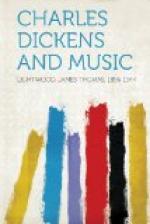This instrument had an extraordinary effect on Major Tpschoffki, familiarly and more easily known as ‘Chops,’ the dwarf, ‘spirited but not proud,’ who was desirous of ’Going into Society’ (G.S.), and who had got it into his head that he was entitled to property:
His ideas respectin’ his property never come upon him so strong as when he sat upon a barrel-organ, and had the handle turned. Arter the wibration had run through him a little time he would screech out, ’Toby, I feel my property coming—grind away! I’m counting my guineas by thousands, Toby—grind away! Toby, I shall be a man of fortun! I feel the Mint a-jingling in me, Toby, and I’m swelling out into the Bank of England.’ Such is the influence of music on a poetic mind.
Dickens found the streets in New York very different from those in London, and specially remarks how quiet they were—no itinerant musicians or showmen of any kind. He could only remember hearing one barrel-organ with a dancing-monkey. ’Beyond that, nothing lively, no, not so much as a white mouse in a twirling cage.’
We must not forget that he has two references to pipe organs in his American Notes. When he visited the Blind School at Boston he heard a voluntary played on the organ by one of the pupils, while at St. Louis he was informed that the Jesuit College was to be supplied with an organ sent from Belgium.
The barrel-organ brings to mind Jerry and his troupe of dancing-dogs (O.C.S.), especially the unfortunate animal who had lost a halfpenny during the day, and consequently had to go without his supper. In fact, his master made the punishment fit the crime; for, having set the stop, he made the dog play the organ while the rest had their evening meal.
When the knives and forks rattled very much, or any of his fellows got an unusually large piece of fat, he accompanied the music with a short howl; but he immediately checked it on his master looking round and applied himself with increased diligence to the Old Hundredth.
In Dombey and Son there is a very apt comparison of Mr. Feeder, B.A., to this instrument. He was Doctor Blimber’s assistant master, and was entrusted with the education of little Paul.
Mr. Feeder, B.A. ... was a kind of human barrel-organ with a little list of tunes at which he was continually working, over and over again, without any variation. He might have been fitted up with a change of barrels, perhaps, in early life, if his destiny had been favourable, but it had not been.
So he had only one barrel, his sole occupation being to ’bewilder the young ideas of Dr. Blimber’s young gentlemen.’ Sometimes he had his Virgil stop on, and at other times his Herodotus stop. In trying to keep up the comparison, however, Dickens makes a curious mistake. In the above quotation Feeder is assigned one barrel only, while in Chapter XLI we are told that he had ‘his other barrels on a shelf behind him.’




